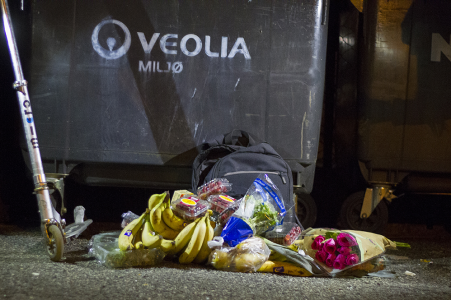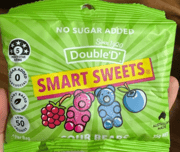This Aussie dumpster diver has a secret to scoring free meals
As the modern age continues to bring us its fair share of troubles, it's vital to remember that there is always a silver lining to be found. While some of us struggle to make ends meet or find ways to save on our grocery bill, a certain Lismore, NSW community volunteer has tapped into an extraordinary food source sitting under our very noses—supermarket dumpsters.
Introducing the unconventional world of 'dumpster diving', where desperate or thrifty Aussies are sourcing perfectly good food from the heaps of waste generated by our local supermarkets.
'You can save hundreds of dollars from one dumpster dive,' claims Andrew, our community volunteer turned dumpster-diving trailblazer. He has dedicated over a decade to rummaging through supermarket bins and educating others on the art of dumpster diving, an activity he believes could help anyone during times of financial hardship.

Determined to make a difference, Andrew has taken his passion a step further, hosting workshops in Lismore, NSW, to teach folks how to safely and successfully dive headfirst into the world of dumpster diving, promising a 'treasure hunt' for anyone eager to take part.
'I couldn't have imagined the insane amount of perfectly good food that is thrown away,' he told Yahoo News Australia. 'It's really shocking and disturbing.' Leading a local Facebook group to promote his upcoming workshop, Andrew extends an invitation to his fellow dumpster diving enthusiasts, promising an 'incredibly satisfying adventure'.
Dumpster diving is pretty much what the name suggests – scavengers sifting through other people's rubbish (mainly shops' bins) with the hope of finding something valuable or, in Andrew's case, perfectly edible food that has been carelessly discarded.
The legality of dumpster diving varies between council areas and is generally considered illegal in Australia, akin to trespassing. However, Andrew claims that police and supermarket workers often turn a blind eye when they see him rummaging about.
As food prices skyrocket, taking a toll on Australian households, the prospect of discovering free and edible food becomes all the more enticing. Andrew recounts his incredible finds, including cartons of unbroken eggs, milk, bacon, hummus, vegetables, and sourdough bread.
'Some people are concerned for health and safety... Maybe 50 per cent of food isn't past its expiry,' he says.
However, there are risks associated with consuming dumpster-dived food. Edward McCartney from Food Safety Plus warns against the dangers of ingesting food without knowing its reason for disposal.
'Perishable food would also not be stored at the correct temperature in the bin, allowing dangerous bacteria to grow...[such] bacteria would not change the appearance, colour or odour of the food,' he cautions.
Despite its controversial nature, Andrew stands firm in his belief that dumpster diving is an ingenious solution to the multiple challenges our society is facing.
'The thing with dumpster diving is that it basically appeals to universal values. Nobody agrees with throwing away good food while others go hungry,' he argues.
Most importantly, try to shrink your grocery bill without compromising your health. While dumpster diving can be a great way to get food for free, it’s best to stick to safe, sanitary, and conventional methods of shopping.
 Andrew's words of encouragement to give dumpster diving a try have sparked curiosity. Members, what are your thoughts about this story? Would you ever consider exploring the world of dumpster diving? Share your insights and experiences down below—we're all ears!
Andrew's words of encouragement to give dumpster diving a try have sparked curiosity. Members, what are your thoughts about this story? Would you ever consider exploring the world of dumpster diving? Share your insights and experiences down below—we're all ears!
Introducing the unconventional world of 'dumpster diving', where desperate or thrifty Aussies are sourcing perfectly good food from the heaps of waste generated by our local supermarkets.
'You can save hundreds of dollars from one dumpster dive,' claims Andrew, our community volunteer turned dumpster-diving trailblazer. He has dedicated over a decade to rummaging through supermarket bins and educating others on the art of dumpster diving, an activity he believes could help anyone during times of financial hardship.

According to Andrew, the majority of the food he discovers in supermarket bins is still within its expiration date and is safe to consume. Source: Studvest
Determined to make a difference, Andrew has taken his passion a step further, hosting workshops in Lismore, NSW, to teach folks how to safely and successfully dive headfirst into the world of dumpster diving, promising a 'treasure hunt' for anyone eager to take part.
'I couldn't have imagined the insane amount of perfectly good food that is thrown away,' he told Yahoo News Australia. 'It's really shocking and disturbing.' Leading a local Facebook group to promote his upcoming workshop, Andrew extends an invitation to his fellow dumpster diving enthusiasts, promising an 'incredibly satisfying adventure'.
Dumpster diving is pretty much what the name suggests – scavengers sifting through other people's rubbish (mainly shops' bins) with the hope of finding something valuable or, in Andrew's case, perfectly edible food that has been carelessly discarded.
The legality of dumpster diving varies between council areas and is generally considered illegal in Australia, akin to trespassing. However, Andrew claims that police and supermarket workers often turn a blind eye when they see him rummaging about.
As food prices skyrocket, taking a toll on Australian households, the prospect of discovering free and edible food becomes all the more enticing. Andrew recounts his incredible finds, including cartons of unbroken eggs, milk, bacon, hummus, vegetables, and sourdough bread.
'Some people are concerned for health and safety... Maybe 50 per cent of food isn't past its expiry,' he says.
However, there are risks associated with consuming dumpster-dived food. Edward McCartney from Food Safety Plus warns against the dangers of ingesting food without knowing its reason for disposal.
'Perishable food would also not be stored at the correct temperature in the bin, allowing dangerous bacteria to grow...[such] bacteria would not change the appearance, colour or odour of the food,' he cautions.
Despite its controversial nature, Andrew stands firm in his belief that dumpster diving is an ingenious solution to the multiple challenges our society is facing.
'The thing with dumpster diving is that it basically appeals to universal values. Nobody agrees with throwing away good food while others go hungry,' he argues.
Alternatives to Dumpster Diving for Saving Money on Groceries
While dumpster diving can be a time-consuming activity that puts one at risk for foodborne illness, it is not the only way to save money on groceries. There are several alternatives that can help Aussie shoppers stretch their grocery pennies.Plan Ahead & Take Advantage Of Special Deals
For starters, shoppers can plan ahead to take advantage of special deals. Planning a few meals at a time instead of generating a grocery list at the last minute can help maximise savings. Additionally, shop around grocery stores and supermarkets to find the lowest prices.Opt For Budget-Friendly Alternatives
Cheap items don’t have to mean unhealthy items. Try opting for budget-friendly alternatives from the store more often. For example, if your store carries a store-brand oats, it may be cheaper than the name-brand variety.Meal Prepp, Freeze Food, & Buy In Bulk
Shoppers can also try meal prepping, freezing perishable items, and considering bulk items. You can even buy produce in bulk and freeze it for later use.Most importantly, try to shrink your grocery bill without compromising your health. While dumpster diving can be a great way to get food for free, it’s best to stick to safe, sanitary, and conventional methods of shopping.
Key Takeaways
- A NSW community volunteer is teaching others about 'dumpster diving' to save money on groceries and help feed disadvantaged groups.
- Andrew has been rummaging through supermarket bins for over a decade and hosts workshops to teach individuals how to participate safely and successfully.
- Dumpster diving is considered illegal in Australia and treated similarly to trespassing, though Andrew claims police and supermarket workers often turn a blind eye.
- There are risks associated with eating food found while dumpster diving, including spoiled food, incorrect allergen labelling, and dangerous bacterial growth.







